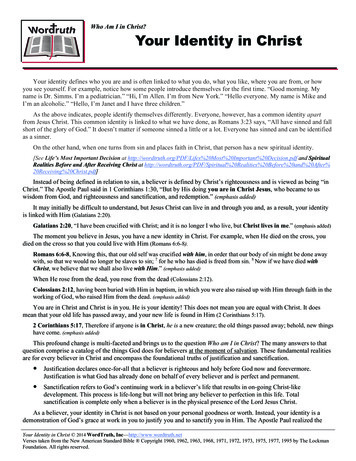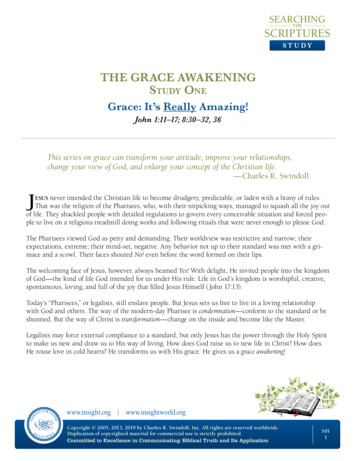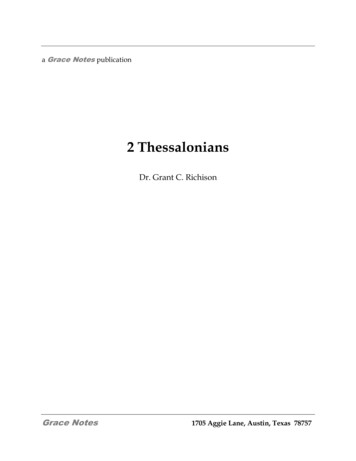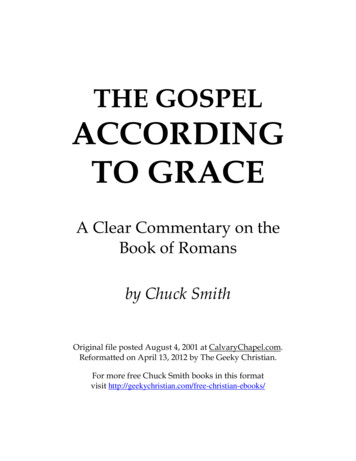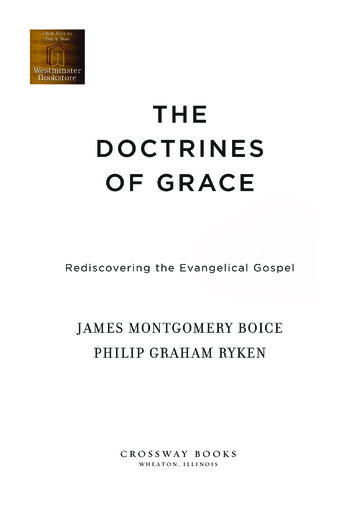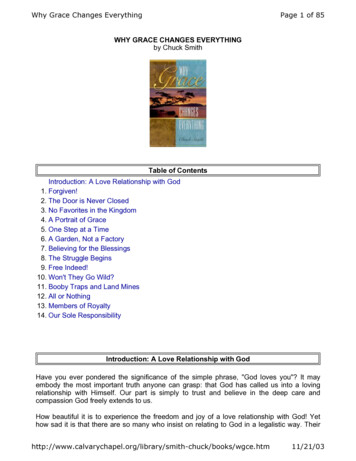
Transcription
Why Grace Changes EverythingPage 1 of 85WHY GRACE CHANGES EVERYTHINGby Chuck SmithTable of ContentsIntroduction: A Love Relationship with God1. Forgiven!2. The Door is Never Closed3. No Favorites in the Kingdom4. A Portrait of Grace5. One Step at a Time6. A Garden, Not a Factory7. Believing for the Blessings8. The Struggle Begins9. Free Indeed!10. Won't They Go Wild?11. Booby Traps and Land Mines12. All or Nothing13. Members of Royalty14. Our Sole ResponsibilityIntroduction: A Love Relationship with GodHave you ever pondered the significance of the simple phrase, "God loves you"? It mayembody the most important truth anyone can grasp: that God has called us into a lovingrelationship with Himself. Our part is simply to trust and believe in the deep care andcompassion God freely extends to us.How beautiful it is to experience the freedom and joy of a love relationship with God! Yethow sad it is that there are so many who insist on relating to God in a legalistic way. uck/books/wgce.htm11/21/03
Why Grace Changes EverythingPage 2 of 85righteousness is based on what they can do for the Lord instead of on what He has alreadydone for them. They carry around a huge list of "do's and don'ts" to keep them bound toGod.I am no stranger to that depressing kind of negative righteousness. As I was growing up, Iconsidered myself one of the most godly kids on the block because of what I didn't do. Ididn't smoke. I didn't dance. I didn’t go to shows. I was taught that such things were utterlysinful. So not only did I avoid those things, I also believed I was far more righteous than myweaker friends who indulged in them. I thought I was much more holy than the preacher'skid, who was known to pick up old cigarette butts and smoke them on the sly. I was aboveall that, and I was sure God noticed.Still, I had a big problem. Although I didn't go to shows, I longed to see Snow White, so I feltcondemned. I would get saved again every Sunday night and would promise God that nextweek was going to be different. I was lucky if my relationship with Him made it pastbreakfast Monday morning.Because my righteousness was a matter of willpower and effort, before long my relationshipwith God became a tremendous strain. Every summer I would attend our church youthcamp. On the last evening we would build a huge bonfire and gather around to sing worshipchoruses such as "I Surrender All" and "I Will Follow Thee, My Lord." During thisemotionally charged time we were asked to write out on paper either an area of our livesthat we wanted God to change or a commitment we wanted to make. Each of us would thentake a pine cone, wedge our commitment paper into it, and toss it in the fire. As I watchedmy pine cone burn, tears would run down my cheeks. I would tell God that I wanted my lifeto be consumed by His love and that I wanted to give myself completely over to servingHim.As we left the bonfire we were directed to a little table where camp leaders had laid out astack of cards that read, "I promise, by the grace of God, that in the coming year I will neverenter a theater, I will never smoke a cigarette, I will never drink an alcoholic beverage, I willnever use foul language, and I will not attend any dances." We would sign thesecommitment cards and carry them around with us in our wallets all year long.I was careful to keep all my commitments - but I also ended up in a draining, legalisticrelationship with God. I had very little joy in my walk with Christ because I was tied to Godby a contract. I couldn't break my agreement; hadn't I signed and dated it, and didn't I carryit around with me in my back pocket? No, I was committed to keeping this agreement and Ifiercely believed that God owed me something for my efforts. God had to be good to me. atleast, better to me than He was to those who didn't follow through on their commitments.Imagine my shock, then, when my friends who weren't nearly as righteous as I won thecontest where we tried to guess the number of jelly beans in the jar! I would grow angry andask, "God, why didn't You bless me? You know I deserve to win more than they do." Themore I thought about it, the more confused I became. Here I was keeping my end of thebargain, yet God seemed to pay no attention at all. I constantly felt let down.Every once in a while, of course, I would get honest with myself and begin to see that Iwasn't nearly as righteous as I liked to think. I knew that my attitude frequently was not ck/books/wgce.htm11/21/03
Why Grace Changes EverythingPage 3 of 85it should have been. There were moments when I knew I had thoroughly fallen short ofGod's will for my life. I recall a time in high school when I snuck into a show. For six monthsafterwards I lived in utter condemnation because I had broken my commitment. Often Iwould give up on the idea that God would ever see fit to bless me. There were a lot of thingsI wanted to pray for, but what right did I have to ask Him for anything when I had failed Himso miserably?This heavy burden of works-righteousness carried over into my early ministry years inTucson, Arizona. It didn't take long for me to realize that there had to be more to ministrythan what I was experiencing, more to a relationship with God than what I enjoyed. To makematters worse, I would watch the meetings of some of the major evangelists of the day asthey passed through the state, and see tents jammed with people being saved and othersexperiencing what seemed to be miraculous healings.I longed to see that kind of power evident in my own life and ministry. Therefore I beganearnestly to seek God with fasting and prayer out in the Tucson desert. I would take offalone to wait on the Lord with only a jug of water, a Bible, and a notebook for company. Ibegged God for His blessing, His power, and His anointing on my life. After a round of suchspiritual discipline, I would work up a sense of excitement, believing that God was about tobless our church because I had fasted and prayed. I could hardly wait for the next service tosee what God was going to do.Unfortunately, I grew so weak from fasting that by Sunday I could hardly stand up behindthe pulpit. My mind would wander so much that I could barely present a coherent message.The people would fall asleep and I would feel devastated. Here I had expected atremendous move of God. and instead, a chorus of snoring broke out. I would getfrustrated and angry and think, But God, haven't You seen how I have fasted and prayed?Surely You ought to bless this church - and me too, while You're at it!I did not understand at the time that my fasting and praying were attempts to obligate God,to force Him to do what I wanted. I thought if people could just see miracles like thosedescribed in the book of Acts, they would be convinced about the reality of Jesus Christ.But later I discovered that the ultimate witness we can offer the world is the love we have forone another, a love that flows from the very heart of God Himself. Conforming to rules andregulations simply can't produce that kind of love relationship. We can try to impose the lawon our relationships, but God's love is the only way to gain the stability and security we longfor. The Bible tells us that love is the fulfillment of the law. In fact, when asked which wasthe greatest commandment, Jesus replied that it was to love the Lord with all our heart,mind, soul, and strength, and to love our neighbor as ourself. Love, not the law, is the key toour relationship with God and with one another.God wants us to experience the beauty of being drawn to Him by a cord far stronger thanthe obligation and guilt of the law. If we were still bound to God by a list of rules andregulations, we would soon find ourselves chomping at the bit and struggling against therestraints. There is a huge difference between being bound in relationship by the joy of love,and being tied up in obligation and guilt.God never intended that His people be bound by an endless list of external pressures. /books/wgce.htm11/21/03
Why Grace Changes EverythingPage 4 of 85isn't pleasing to God to hear us moan and complain, "What a drag! I have to go to churchagain when there are a hundred other things I'd rather do. But if I don't go, God won't loveme anymore and the preacher will give me the evil eye for missing his sermon."If we find ourselves laboring under such burdensome attitudes, it is a sure indicator that weare not operating in a love relationship with God, but have instead fallen into legalism. Godcertainly wants better things for us than a drab, loveless existence!God never made out a long contract that says, 'Abide by all my terms and I will love you andbless you; but if you violate even the smallest provision, it's all null and void and you are outof My kingdom!" Christians are not bound by any heavy contract to God. Paul declared thatthe only thing that constrained him was the love of Jesus Christ (II Corinthians 5:14).It took years of God's patient work in my life before I was able to break free of the bondageof self-righteousness. For years I had heard of others getting a tremendous blessing out ofthe book of Romans. Since I was always looking for a blessing, I finally decided to dig into it.And yet, try as I might, it was difficult for me to relate to. I decided to persevere anyway andsee if I could discover what it was that others found so compelling.One day as I studied this great book, God did nothing less than revolutionize myrelationship with Him. It was there that He revealed to me the meaning of that simple, wellworn, but rarely understood word: grace. From that time onward I encountered such a freeand loving relationship with God that I could not have cared less if I ever saw a spectacularmiracle in my ministry. I discovered that even though I was prone to stumble and fall, mymistakes didn't alienate me from God. My relationship with Christ became less a rollercoaster of highs and lows and more of a steady ride in His wonderful love.Imagine how I felt when I discovered the profound truth, "If God is for us, who can beagainst us?" (Romans 8:31). For years I had labored under the misconception that God wasagainst me. I pictured Him waiting for me to step out of line so He could send fiery judgmentcrashing down on me. I finally understood that God wanted me to enjoy the peace of Hisunconditional love, not the fear that always accompanies legalism. I began to relate to Godin a whole new way.I learned that the law was intended to serve as a protective guide to God's people. Itsrestraints were to function like a parent's safety guidelines, intended only for the welfare of achild. Once we discover the wonder of God's grace, we need no longer be locked in by thelaw. We can approach life freely because we love God and won't want to do anything toharm the loving relationship we have with Him. When we know the joy of fellowship withGod, we won't want any barriers, any blocks, to come between us.In fact, the more we experience of God's love, the more He Himself becomes the primarydesire and focus of our life. The coercive aspects of the law become unnecessary. We findourselves longing to please God simply because we love Him.And that is the greatest joy in life - to experience a genuine love relationship with God. Toknow that He is for us, that He loves us, is the greatest source of security any person willever know. Discovering the glorious grace of God was one of the most important events inmy whole spiritual experience. I learned to relate to God on an entirely new basis: not on k/books/wgce.htm11/21/03
Why Grace Changes EverythingPage 5 of 85basis of my works, or of my righteousness, but on the basis of God's love for me throughJesus Christ.That is grace, and that is what makes life worth living. In fact, it is what makes life - real life,abundant life, fulfilling and satisfying life - possible at all. For when our eyes are opened tothe astonishing truth that our relationship with God does not depend upon the puny pebbleof our own efforts but upon the massive rock of His unchanging and loving character, lifeopens before us in a technicolor explosion of awesome possibilities.Grace transforms desolate and bleak plains into rich, green pastures. It changes grit-yourteeth duty into loving, enthusiastic service. It exchanges the tears and guilt of our own failedefforts for the eternal thrill and laughter of freely offered pleasures at the right hand of God.Grace changes everything!Have you discovered the deep joy of living in God's grace? Would you welcome a reminderthat our standing with God depends not on our own weak efforts but on what His almightyarm has accomplished for us? Wherever you are in your spiritual journey, I invite you now totake a few moments to consider with me the amazing grace of God poured out on ourbehalf.For it's true, you know: Grace changes everything!1. Forgiven!One evening I heard a speech by former Secretary of State Dr. Henry Kissinger. He told thegathering that his first mistake is mentioned in his autobiography on page 1159. He alsonoted it was his last mistake.If I were to write an autobiography, my first mistake would probably be found in the prologueto the book, if not in the table of contents itself! There is no way I would ever try to standbefore God on the basis of my own goodness. It's not that I am some rotten, morallydepraved individual; it's just that I am nowhere near good enough to be acceptable beforean absolutely holy God.A Dead-End RighteousnessOne very common way of trying to become righteous is to define what righteousness is andisn't, to set up a code, and then live according to this code. There's only one problem: Noone ever lives up to their own code, so we conjure up a great number of excuses to explainwhy we fail. The most common is that our failure isn't really our fault.If I drop a glass and break it, it isn't that I am uncoordinated; it's because someone calledme when he shouldn't have. Others were making too much noise in the other room, so mymistake is really their fault. "Look what you caused me to do!" I say. "You made me do it, soit isn't my fault." None of us like to accept huck/books/wgce.htm11/21/03
Why Grace Changes EverythingPage 6 of 85This attitude goes all the way back to Adam. He blamed his failure on Eve. "The woman thatyou gave to be my wife," he told God, "it's her fault that I am the way I am" (see Genesis3:12). Proverbs declares, "There is a generation that are pure in their own eyes, and yet isnot washed from their filthiness" (Proverbs 30:12).If you think you are a very pure person and yet are not washed from your filthiness,righteousness has evaded you. The Bible says, "If we say that we have no sin, we deceiveourselves, and the truth is not in us. If we say that we have not sinned, we make Him a liar,and His word is not in us" (I John 1:8,10). Scripture states our problem clearly: "All the world[stands] guilty before God. all have sinned and come short of the glory of God" (Romans3:19,23).Whenever we try to establish our righteousness by keeping rules, eventually we are forcedto admit we operate on a sliding scale. I will always look morally better to myself than I do toyou, and you will always look morally worse to me than you do to yourself. I can look at yourlife and see all kinds of flaws; but when I look at myself, the few flaws I notice don't seem sobad.Even the righteousness I can achieve by what I do is only a sham righteousness. The Bibledeclares, "We are all as an unclean thing, and all our righteousnesses are as filthyrags" (Isaiah 64:6).If our relationship with God depended upon being righteous and good, we would nevermake it.It's almost comical to see some people parade around in their rags. They saunter aroundwith their "holier than thou," gaudy kind of religiosity, with a hyperspiritual air about them.They talk in whispered tones because they think it sounds holy and righteous. They useKing James English because, as we all know, "Thees" and "Thous" are far more righteousthan "yous" and "yours." We see them puffed out in their righteousness, strutting around,showing off. and God shakes His head and says, "Filthy rags."If my relationship with God depended upon my being righteous and good, I would nevermake it. I have failed. I have come short of the glory of God. The best that I can manage iswhen I am having a good day, my biorhythms are right, and everything is going well - reallyflowing. I'm cool. Man, I am really something. But even on my best days God looks downand says, "Filthy rags." My best efforts simply aren't enough.Trying to keep the law condemns me, for the true law deals with inward attitudes. Backwhen I labored under this standard of self-righteousness, I found I resented certain thingsother people were doing. I became bitter. I realized that I hated certain people and that Iwas jealous and covetous of the things they owned. I noticed I had violated my own codeand had wiped out my relationship with God. Nothing was left to do but to start all overagain.Unfortunately, just about the time I would feel as though I were restoring a right relationshipwith God, something happened. I blew up and down I went again. I would be forced to startclimbing the ladder of good works once more until I got to the rung where I finally felt I couldrelate to God. No sooner would I reach that rung, however, than somebody would pull books/wgce.htm11/21/03
Why Grace Changes EverythingPage 7 of 85stupid move on the freeway and I would yell, "Where did you get your driver's license, youidiot?" And the whole process would start all over again.What's the Standard?Those who believe that they can be made acceptable to God without Jesus need to dealwith some crucial questions. If they believe they can make it to heaven by achieving acertain level of goodness, what standard do they have to live up to? What will God requireof them? So many say, "I feel that I am basically a kind and good person and am willing tostand before God on my own merit."But these people fail to take into account that God's standards are different than ours. Jesusshowed us God's requirement for those who would strive for heaven on their own powerwhen He said, "Be ye therefore perfect, even as your Father which is in heaven isperfect" (Matthew 5:48). The standard for the person who wants to be right with God isnothing short of absolute perfection - not just trying hard, or being sincere, but a flawlesskeeping of all God ever intended for man. Clearly, those who believe they can earn eternallife by their good works have a distorted understanding of the holiness of God and what itmeans to be right with God.If we are going to set up a standard of righteous conduct, we need to use the oneestablished by Jesus Christ. Jesus is the only person whose life prompted God to say, "Thisis my beloved Son, in whom I am well pleased" (Matthew 3:17). To enjoy fellowship withGod, we must be as righteous as Jesus. In John 16:8,10 Jesus said, 'And when he [that is,the Holy Spirit] is come, he will reprove the world of. righteousness, because I go to myFather, and ye see me no more." Jesus' ascension into heaven was God's witness to theworld about His Son. It is as if He were saying, "This is the righteousness that I will accept inheaven." Jesus' life is the only standard of righteousness. If I want to be accepted by God, Imust be as righteous as Jesus Christ. The Scriptures show that there is only one kind ofrighteousness that God will accept: the very righteousness of Christ Himself. So, if we wantto stand before God on the basis of our own good works, we must live a life that measuresup to the goodness we see in Jesus.But I realize that is impossible. I can't achieve that kind of righteousness. Jesus Himselfsaid, "I say unto you, That whosoever looketh on a woman to lust after her hath committedadultery with her already in his heart" (Matthew 5:28). He said, "I say unto you, Thatwhosoever is angry with his brother without a cause shall be in danger of thejudgment" (Matthew 5:22). He further said, "Love your enemies, do good to them which hateyou. Bless them that curse you, and pray for them which despitefully use you. And unto himthat smiteth thee on the one cheek offer also the other; and him that taketh away thy cloakforbid not to take thy coat also. Give to every man that asketh of thee; and of him that takethaway thy goods ask them not again" (Luke 6:27-30). And He commanded us to "love yeyour enemies, and do good, and lend, hoping for nothing again!' (Luke 6:35).How can anybody be that righteous? I know I can't. I've failed miserably. Does that mean,then, that I must forever be alienated from God? Is there no way I can ever enjoy fellowshipwith God? Do I have to go on in this emptiness, in this frustration, seeking after andreaching out for something I can never chuck/books/wgce.htm11/21/03
Why Grace Changes EverythingPage 8 of 85If there is any hope for us to be forgiven by God, there must be another basis for it otherthan our works. As Paul declares, "By the deeds of the law there shall no flesh be justified inhis sight" (Romans 3:20).If we are ever to enjoy fellowship with God, it will have to be on some basis other than ourown righteousness. The rules that God has established for righteousness are far toostringent for us to abide by. We can't do it. Our only hope is that another form ofrighteousness has been provided for us, a righteousness based on a totally differentprinciple than our own works.Thank God, there is such a principle! It's called grace.What Is Grace?The root meaning of the word grace is "beauty." In the New Testament, grace means "God'sunmerited favor." Grace is God giving to me something that I cannot obtain on my own.Grace is being accepted by God even though I do not deserve it, even though I am notworthy of it.The Bible teaches that I receive grace on the basis of my belief and trust in God. Hebrews11:6 declares that without faith it is impossible to please God. We are forgiven by a holyGod simply by believing in Jesus Christ and in His death on our behalf. When we place ourtrust in Him, our slate is wiped clean.It is not possible for us to be forgiven by complying with any law or religious system. It wasnecessary that Christ go to the cross in order that He might establish the basis whereby Ican approach God.When Jesus was praying in the garden, He said, "Father, if thou be willing, remove this cupfrom me: nevertheless not my will, but thine, be done" (Luke 22:42). He was saying, "If it ispossible that men can be saved by any other means than My death - if they can be savedby being religious, by somehow gaining their own righteousness - then I do not want to go tothe cross. Please don't put Me through this horrible ordeal." But it was not possible, and soHe went to the cross, died, was buried, and rose again. His death made it possible for Godto extend His grace to you and me.Perhaps an illustration will help to make this clear. Imagine that you were charged with acrime. You are accused of trespassing on a neighbor's property. As any defense attorneyknows, there are two possible ways for you to be cleared of the charge. You may seek toprove that you didn't trespass on his property, or you may seek to prove that you had everyright to be there.Now apply this logic to our spiritual situation. God has charged us with being sinners - forrebelling against His law and His will. He has charged us with unrighteousness.How can we be justified from those charges? We can't say that we are innocent, for we areguilty. All of us have sinned. Nor can we say that we had a right to do what we did becausewe had no such right. Our actions were clearly wrong. How, then, can the law be of value tous in our desire to be forgiven? The answer is, it can't. The case is open and shut. We huck/books/wgce.htm11/21/03
Why Grace Changes EverythingPage 9 of 85have a right to do it, we did it anyway, and thus we stand guilty.The Great Bank RobberyLet's change the illustration. Suppose that I robbed a bank willfully and deliberately. The lawcondemns me because I can't say I didn't do it or prove that I didn't do it. The video cameracaught me. I can't say I had a right to do it because robbery is not included in the FirstAmendment. Therefore, there is no way I can be forgiven within the law.During the trial, I might try to say, "I promise I won't rob any more banks as long as I live. Iwill live a good, clean life from now on. I will never take anything from anybody wrongfullyagain." That still doesn't justify me from what I have already done. I might try to say that Ishould be forgiven because I did so much good with the money. I gave some to the churchand I fed my family. But my "righteous" deeds cannot counterbalance or absolve my guilt.The judge may order that I pay back to the bank all the money that I took. As part of mysentence, he may order me to pick up tin cans along the freeway to help keep Americabeautiful. I may spend the rest of my life doing good things, but still I will not be absolved ofwhat I have done. All the works of the law cannot erase my guilt. My past wrongdoings stillexist. I am a robber and the verdict is clear.Why is it, then, that in spiritual matters so many people seek to plead innocent before Godby virtue of all their good works?There are many of us who respond to our sin, guilt, and unrighteousness with regret andnew resolutions. We want to make amends and turn over a new leaf. But those efforts can'twin our forgiveness. Even our best efforts cannot take away the guilt of what we havealready done. We can never be justified by good works. Even a whole life of good workscannot atone for a single sin.God's basis of forgiveness is the sacrifice of His only begotten Son. All of our guilt - all ofour past and future wrongdoings - have been laid to the charge of Jesus Christ, the innocentLamb, the perfect one who knew no sin. He died for us. He bore our guilt; He suffered anddied for our sins. Paul wrote, "For He hath made him to be sin for us, who knew no sin; thatwe might be made the righteousness of God in him" (II Corinthians 5:21). Jesus became sinfor us that we might be pardoned through Him. In other words, He switched places with us."Though he was rich, yet for your sakes he became poor, that ye through his poverty mightbe rich" (II Corinthians 8:9). He has taken our sin and forgiven us through our simple faithand trust in Him.Jesus, Our HopeWhen God laid on Jesus the iniquity of us all, Christ received the judgment due us for oursins. He received our deserved punishment, which the Bible declares is death (see Romans6:23). God has declared that if we will believe in Jesus Christ as our Lord and Savior, wewill be forgiven of every wrong thing we have ever done. "The blood of Jesus Christ His Soncleanses us from all sin," says I John 1:7. This cleansing is something the law could neverdo; it is a provision of huck/books/wgce.htm11/21/03
Why Grace Changes EverythingPage 10 of 85We can strive to make it to heaven on our own efforts or we can place our faith in Jesus.The fact is, faith is our only hope. Our good deeds or efforts or works can never earn usforgiveness from God. Paul declared in strong words, "But to him that worketh not, butbelieveth on Him that justifieth the ungodly, his faith is counted for righteousness" (Romans4:5). To him who is not working, but simply believing, God imputes righteousness. Godgives us this forgiveness because of our faith in the finished work that Jesus Christ hasdone for us.The Choice Is YoursYou have a choice. You can strive to make it to heaven by your own efforts and try to be asgood as Christ, or you can place your faith in Jesus and receive your right standing withGod as a gift of His grace.For me, this is no choice at all. I know there is no way that I, in my good works, would evermake it to heaven. I stand hopelessly condemned on the basis of my past sin. I have nochance of being received by God apart from His mercy.The good news is, God has provided a way of acceptance before Him. God, who isabsolutely holy and pure and so righteous that no sin can dwell in His presence, has madea way for people like us to have fellowship with Him. When we believe in this sacrifice thatJesus Christ made for us - even though we didn't deserve it - the Father grants us perfectforgiveness.That's the gospel of grace. Each one of us can relate to God, even though we are far fromperfect. We can still have a beautiful relationship with God through His Son Jesus Christ.When we relate to the Father by faith through His Son, we have a solid relationship. We arenow sons of God. Because He is our Father, we don't have to wonder if we are worthy tocome to Him. We do not come on the basis of our worthiness, but on the basis of ourrelationship with Him.That is what the gospel of grace is all about. God looks at us as though we never committeda single trespass against Him. Now, I have trouble looking at myself like that. I look atmyself in the mirror and say, "Chuck, you are a sinner. You can't control your appetite; youhave so many flaws." And yet God looks at me and says, "Forgiven." He loves me andaccepts me as I am because I am in Jesus Christ. Even as He has accepted His own Son,so now He accepts me. Paul tells us that we have been accepted "in thebeloved" (Ephesians 1:6). The Beloved one is Christ; and you, being in Christ, are acceptedby God just as Christ is accepted.That is why the gospel of grace is th
4. A Portrait of Grace 5. One Step at a Time 6. A Garden, Not a Factory 7. Believing for the Blessings 8. The Struggle Begins 9. Free Indeed! 10. Won't They Go Wild? 11. Booby Traps and Land Mines 12. All or Nothing 13. Members of Royalty 14. Our Sole Responsibility Introduction: A Love Relationship with God


